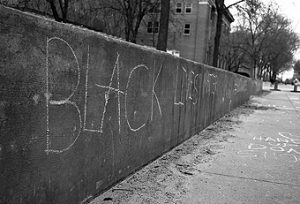 At Passover, we relive the story of the Exodus from enslavement in mitzrayim – the narrow place, which in our story, is Egypt. The retelling of the Passover story is often used to explore other journeys toward liberation from other narrow places, including the African-American journey from slavery.
At Passover, we relive the story of the Exodus from enslavement in mitzrayim – the narrow place, which in our story, is Egypt. The retelling of the Passover story is often used to explore other journeys toward liberation from other narrow places, including the African-American journey from slavery.
We are living during a tremendous groundswell of movement and power by black people on behalf of black life. For parents of Jewish, non-black children, Passover can be a deeply meaningful place to start in helping our children to understand this present-day fight for liberation, as well as the history of enslavement that lies at the foundation of our very own country.
 There’s a danger, though. Children are often taught that anti-black racism is part of our American past, but not part of our present. African-American children will almost always learn – at home and by being alive in the world – that this is not the case. But non-black children are often given the impression that anti-black racism came to an end through the events of two pivotal historic periods: Emancipation and the Civil Rights Movement of the 1960’s.
There’s a danger, though. Children are often taught that anti-black racism is part of our American past, but not part of our present. African-American children will almost always learn – at home and by being alive in the world – that this is not the case. But non-black children are often given the impression that anti-black racism came to an end through the events of two pivotal historic periods: Emancipation and the Civil Rights Movement of the 1960’s.
It is true that these are vitally important moments. But it is not true that these moments mark the end of widespread violence, marginalization and exploitation against black people. When we overlay the Passover story onto these moments in American history, we may end up reinforcing the notion that racism is a thing of the past, and that liberation for black people in America has already occurred.
This Passover, I will be speaking with my 7-year-old son about the history of enslavement in the United States. But instead of talking about the Exodus from Egypt and how it mirrors the history of Emancipation and civil rights in this country, I’ll be centering our conversations on these four questions.
What if we never left Egypt?
The Passover story tells us that the Jewish people left mitzrayim and wandered for 40 years before entering the Land of Canaan. I like to imagine that we used that time to heal from enslavement, to come together as a community of free people and to begin to envision how we would live and who we would be when we entered the Promised Land. Then I imagine us entering this new land, where we were known only as a free and sovereign people.
In American history, Emancipation did not work this way. African-Americans had to fight to reclaim a life as free people and as agents in a country that had based its economy on treating them as objects. This had immediate implications for what life must have been like during Reconstruction. And it has also had long-term effects that we are still experiencing today.

For those of us parenting non-black, Jewish children, if we re-frame our conversations around this fundamental difference – that African-Americans did not leave mitzrayim and had to continue living in Pharaoh’s midst – we can help them to understand why the fight for black life and dignity today is so vitally important.
Ta-Nehisi Coates’s “The Case for Reparations” provides a brilliant overview of the uninterrupted chain of oppressive systems that exploit and marginalize African-Americans – from enslavement through segregation and racist housing policies, up to and including this very moment. This can be a good place for parents to start in grounding themselves for discussions with kids this Passover.
To be comfortable owning other people, what would slave-owners have needed to believe about the people they enslaved?
With this question, we can begin to explore the roots of anti-black racism in American life. For white Americans to be able to own African people – in the same way that they owned their horses and their cattle – it was essential to think of African people as less than human. When we see people as fully human, to treat them in this way would be intolerable and a source of horror and shame. Racism that classified black people as less than human had to be deeply ingrained and widely held in order to support the institution of slavery over centuries.
How did life change immediately after Emancipation?
African-Americans did not step into the parted sea the day that Emancipation legally went into effect. Instead, they were met with deep and intractable resistance to their becoming free people. Many slave-owners did not even inform the African-American people whom they had owned that enslavement had been outlawed. And because African-Americans had been prevented by law from learning to read, it was possible for white people to prevent them from knowing that they were legally free. Imagine relying on those most invested in your enslavement to let you know enslavement had legally ended.
The holiday of Juneteenth commemorates the events of June 19, 1865 when Union soldiers arrived in Galveston, Texas with news that the war had ended and that the enslaved were now legally free. This was a full two and a half years after the Emancipation Proclamation had been signed.
Consider the level of isolation and control that it would take to successfully withhold this information for so long, and the amount of collaboration required between white people in these communities to ensure that African-Americans did not know that they had legal rights. How does this experience differ from that of the Jewish people who left Egypt all together and all at once, leaving behind those who had fought to keep them enslaved?
What would it be like to continue to live with and work for the people who had owned you?
Would you trust them and believe they could treat you fairly? Would they, in fact, be likely to treat you fairly? Would they be inclined to pay fair wages and offer humane working conditions to formerly enslaved people whom they had never paid before? How many generations would it take for the descendants of slave-owners to willingly give up some of their own money and power so that the descendants of enslaved people could have more access to money and power of their own?
150 years can seem like a long time, but it is not. It is deeply challenging and painful to face the fact that our own country was built on the exploitation of black people’s labor. While the particular mechanisms and institutions that maintain the oppression of African-Americans have shifted, the underlying marginalization, exploitation and violence persist.
Our Pesach tradition invites us, year after year, to grapple with this reality and to work toward accountability and repair. This Passover, I wish you meaningful conversations around your seder table, and I wish that we do our best work yet in being truthful, open and earnest in our pursuit of justice.
 By Danica Bornstein
By Danica Bornstein
Danica Bornstein, LICSW, is the Clinical Counselor at Hillel UW. The Hillel Counseling Program is a joint project of Hillel UW and Jewish Family Service and provides counseling for Jewish young adults aged 18-32.
Feature Photo by Phil Roeder / CC BY 2.0



